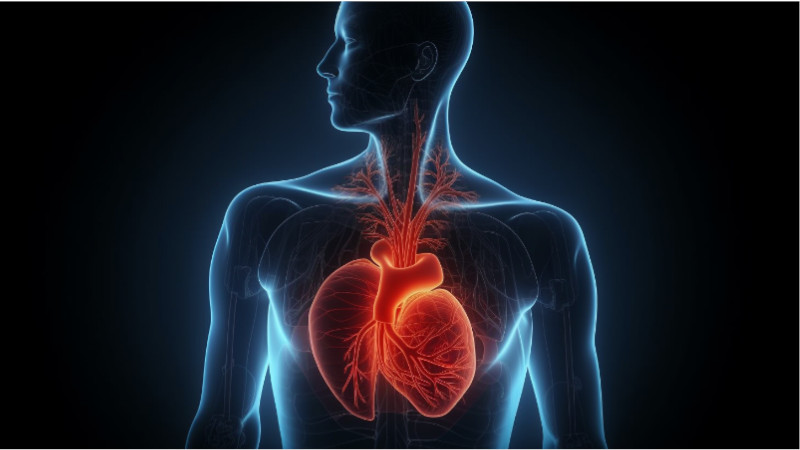In today’s health-conscious world, many individuals are turning to herbal remedies as natural alternatives to pharmaceuticals. These botanical solutions, rooted in ancient traditions, pardon the pun, promise a holistic approach to wellness.
However, as with any remedy, it’s crucial to understand the full spectrum of effects they might have on the body.
One such herbal remedy that has garnered attention is valerian, renowned for its calming properties.
But as its popularity grows, so do the questions surrounding its potential side effects. A pressing question that many have asked is “Can valerian cause heart palpitations?”
In this article, we’ll delve deep into the world of valerian, exploring its benefits, and sources, and addressing the critical question of its impact on heart health.
Table of Contents
Sources of Valerian Root
Valerian, also known as Valeriana officinalis is native to Europe and parts of Asia. Recognised for its distinct strong odour, this herb can grow to be just over six feet tall.
Valerian root has a rich history that traces back to ancient Greek and Roman times when it was used as a traditional medicine. In modern times, people commonly turn to valerian for sleep disorders, particularly insomnia, and it’s also sought after for conditions like anxiety and stress.
While its sedative properties are well-known, it’s essential to note that valerian seems to act as a sedative in the brain and nervous system. 1
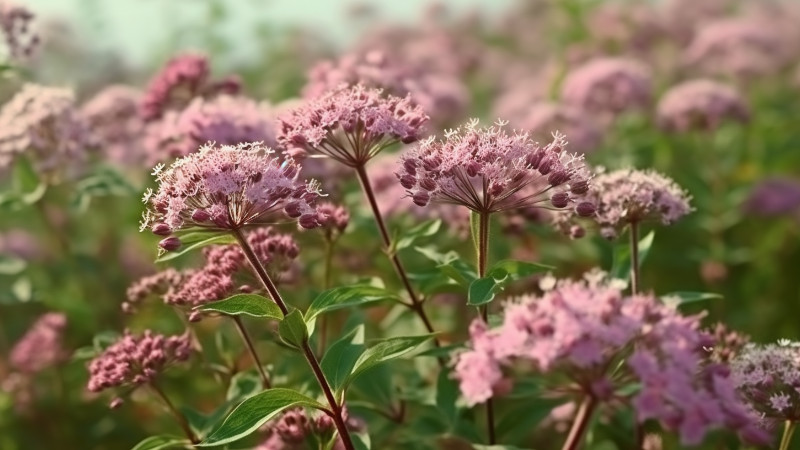
The genus Valerian encompasses over 250 different species, but V. officinalis stands out as the primary species used in both the United States and Europe.
The preparations of valerian that are commonly marketed as dietary supplements are derived from its roots, rhizomes (underground stems), and stolons (horizontal stems). 2
Benefits of Valerian
In the realm of natural remedies, valerian has carved a niche for itself as a go-to herb for various health concerns.
This perennial plant has been celebrated for its potential therapeutic properties from ancient civilisations to modern-day wellness enthusiasts. A short list of the benefits that many turn to valerian for include:
- Sleep Aid 3
- Anxiety and Stress Reduction 4
- Headache Relief 5
- Menstrual Symptom Relief 6
- Stomach Cramps 7
- Heart Health 8
- Digestive Aid 9
Valerian Root; Sleep and Relaxation Benefits
Valerian root has been long relied upon for its potential benefits in improving sleep quality.
Did you know that Insomnia, a prevalent issue affecting approximately one-third of the adult population, can lead to increased absenteeism, heightened healthcare utilisation, and people who struggle to connect to others?
We looked at this more closely when we explored the question ‘How does lack of sleep affect mental health?’
Understandably, valerian root extracts have gained popularity as a remedy for inducing sleep and enhancing sleep quality. But, even with this, we still need to figure out the answer can valerian cause heart palpitations’?
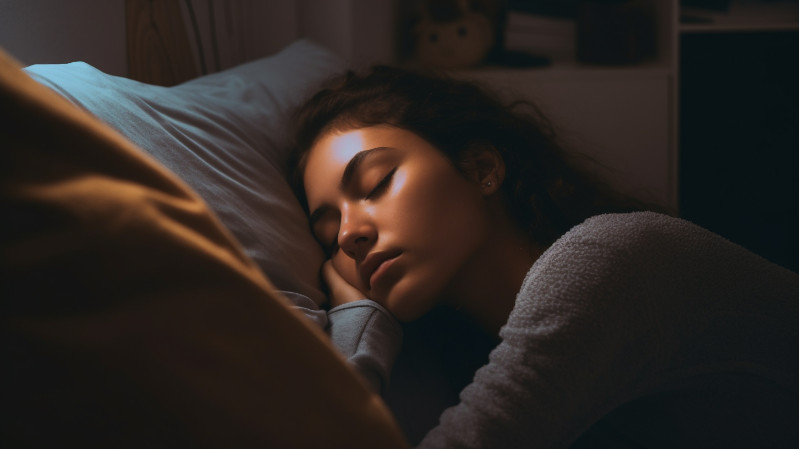
Doctor S. Bent, along with his Team, conducted a systematic review of randomised, placebo-controlled trials on valerian for sleep quality revealing that while most studies had methodological challenges, there was evidence suggesting that valerian might enhance sleep quality without causing side effects. 10
Interestingly, the preparations, doses, and treatment durations of valerian varied across studies. One notable finding in Bent’s study was that valerian showed a statistically significant benefit in improving sleep quality.
For those who are struggling with sleep and considering how valerian might fit into their current routine, regardless of the ‘Can valerian cause heart palpitations’ question, there is something that we need to take a quick look at first; combining valerian with melatonin.
Why can’t you take Melatonin and Valerian root together?
Melatonin and valerian root both possess properties that can induce sleepiness and are natural supplements. It is for that reason that they should not be taken together.
Melatonin is a natural hormone that is produced by the pineal gland in the brain and regulates our sleep-wake cycle and circadian rhythm. It is known as the “sleep hormone” since the pineal gland releases high melatonin when it’s dark and lowers its production when exposed to light.
In short, the longer the night, the more melatonin production is produced and can improve your sleep.
So, you might wonder if it is safe to take valerian and melatonin together. While both promote sleep, combining both can amplify their sedative effects, potentially leading to heightened drowsiness, dizziness, and confusion.
This intensified sedation can impair thinking, judgment, and motor coordination, making activities that require mental alertness, such as driving or operating machinery, even after waking from a sleep state having used them together, quite risky. 11
You should avoid mixing melatonin and valerian root with other sedatives.
If you’re considering using either of these products, it’s always advisable to consult with a healthcare professional to ensure safe and appropriate use beforehand.
Potential Side Effects of Valerian Root
It’s essential to approach the use of Valerian from a well-informed perspective. Like any natural remedy, it comes with its own set of considerations.
It’s crucial to shed light on some of the side effects that can come with using valerian. In the majority of research using valerian root for sleep, participants reported either no side effects or only minor side effects at rates similar to placebo-taking groups.
However, further research has discovered that valerian root may cause some people to have the following negative effects. Let’s take a look at a few in the following sections.
Can Valerian Cause Heart Palpitations After Eating?
Heart palpitations can manifest as a fast or irregular heartbeat sensation. While they are generally benign, they can cause concern for those unfamiliar with the sensation.

Since the 16th century, Valerian root has been widely used to cure heart palpitations, but strangely there have been rare reports of palpitations occurring as a result of treatment or stopping the use of valerian root.
Interestingly, anecdotal reports have claimed that patients who took valerian, or a placebo orally, felt heart palpitations either after consuming or ceasing the use of valerian root. It is worth keeping in mind that these accounts are based on personal experiences and are not derived from scientific studies considering the question ‘Can valerian cause heart palpitations?’ 12
Researchers also found that valerian had been proven to slow the heart rate in some, and had the potential to produce some irregular rhythms and an erratic heartbeat. 13 14
Is Valerian Root Hard on the Kidneys?
If you have kidney disease, you may consider using herbal supplements to aid with any health difficulties you may have.
Particular caution is advisable here in the opinion of medical professionals as taking Valerian root supplements may be dangerous. Some herbal preparations have the potential to harm the kidneys of some people, or perhaps make existing conditions worse.
The function of the kidneys is worth being mindful of here. If they are harmed, their capacity to remove waste products that can accumulate in your body will be limited or potentially blocked.
A notable case involved an 88-year-old man who presented with severe rhabdomyolysis and oliguric acute renal failure. This condition coincided with his consumption of Valerian root in conjunction with Rosuvastatin, a medication he was taking.
The acute kidney injury he experienced, attributed to rhabdomyolysis, might have been exacerbated by a potential interaction between Valerian root and the hepatic metabolism of Rosuvastatin. 15
This case underscores the importance of being cautious when combining herbal supplements like Valerian root with certain medications, as it can have unforeseen impacts on organ functions, including the kidneys. Always seek professional advice, and ask about everything you are currently taking; even long-standing prescriptions.
Does Valerian Root Increase Estrogen?
Valerian root offers the advantage of functioning as a phytoestrogen, a plant-based compound that mimics estrogen.
When estrogen is lacking, phytoestrogens can act as a substitute, and when estrogen levels are excessive, they can help reduce it. By aiding in the regulation of estrogen levels, valerian can address menopausal symptoms. 16
Also, did you know that eating lignans (phytoestrogens found in fruits, grains, and seeds) reduces the growth of tumour cells in women who have just been diagnosed with breast cancer?
Higher flax intake increases cell death, which causes the tumour to grow more slowly and has lower proliferative rates. 17
Is Valerian Root Toxic to the Liver?
Concerns have arisen regarding the safety of valerian, particularly concerning liver health.
According to a study from the NCBI, valerian root has been associated with hepatotoxicity, which means it can potentially harm the liver. This hepatotoxicity is rare, and often reversible upon discontinuation of the use of the herb. 18
In a case presented in the American Journal of Gastroenterology, a 48-year-old woman experienced increased aminotransferase levels, an indicator of liver damage, after consuming valerian root-based herbal tea. 19
Once she stopped consuming the tea, her aminotransferase levels improved. This case underscores the importance of being cautious with herbal supplements and highlights the potential for valerian root to cause elevations in liver enzymes.
Exercising caution with valerian is a good idea, particularly if you have conditions that may present complications when valerian is used.
Valerian Root in Comparison with Other Herbs
Why is Chamomile Good for Anxiety?
Chamomile benefits anxiety due to its natural constituents that possess anxiolytic and antidepressant properties. The active ingredients in chamomile, such as apigenin which contains 0.8% to 1.2% in chamomile, bind to benzodiazepine receptors in the brain, which can help reduce symptoms of anxiety. 20
Additionally, chamomile extracts have demonstrated the ability to modulate neurotransmitter activity in the brain, further contributing to its calming effects. Clinical trials have shown that chamomile extract can significantly reduce moderate to severe symptoms of generalised anxiety disorder. 21
Is Chamomile Tea Anti-inflammatory?
Chamomile tea, derived from the chamomile plant, has been traditionally used for its medicinal properties. One of the notable benefits of chamomile is its anti-inflammatory effects.
The plant contains essential oils such as bisabolol, bisabolol oxides A and B, and matricin, which exhibit anti-inflammatory properties. 22

The flavonoid, apigenin, found in chamomile possesses anti-inflammatory properties. This is attributed to its ability to modulate the body’s response to stress and damage at the cellular level. 23
Studies have shown that apigenin can suppress the production of pro-inflammatory cytokines, which are signalling molecules that mediate and regulate immunity, inflammation, and hematopoiesis.
Specifically, apigenin has been observed to significantly reduce the levels of interleukin-6 (IL-6) and tumour necrosis factor-alpha (TNF-α), both of which play a key role in the inflammatory process. 24
Does Chamomile Lower Blood Pressure?
Did you know that chamomile may have potential benefits in reducing systolic blood pressure? 25
Chamomile, particularly its active component, flavones, has been studied on the potential of flavones to reduce blood pressure and cholesterol levels, two significant indicators of your risk of heart diseaseTrusted Source.
Chamomile has demonstrated a hypotensive effect in spontaneously hypertensive rats under clinical studies. It was found that a single oral administration of Chamaemelum nobile aqueous extract led to a significant reduction in systolic blood pressure 24 hours after its administration.
Which is better Valerian Root or Lavender?
Determining whether valerian root or lavender is “better” largely depends on the context and the specific application. Both herbs have a long history of use in traditional medicine and offer a range of health benefits.
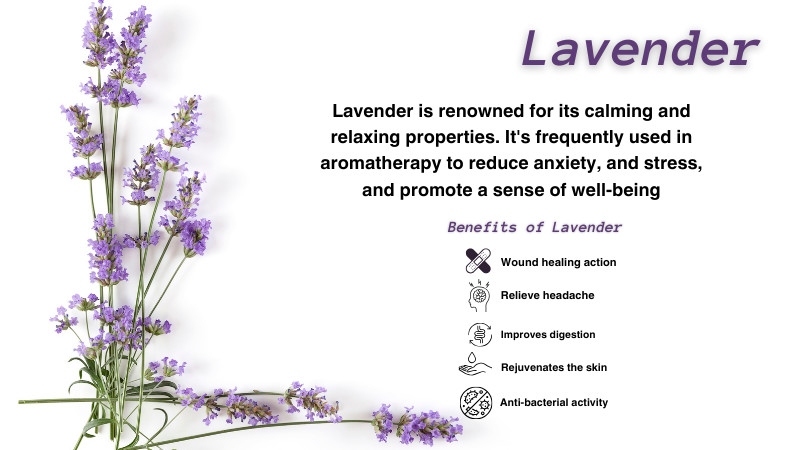
In terms of sleep and relaxation, both valerian root and lavender can be effective. However, valerian might be more potent for those with severe insomnia, while lavender can be beneficial for mild sleep disturbances and relaxation.
It’s also worth noting that people might react differently to each herb, so personal experience plays a role.
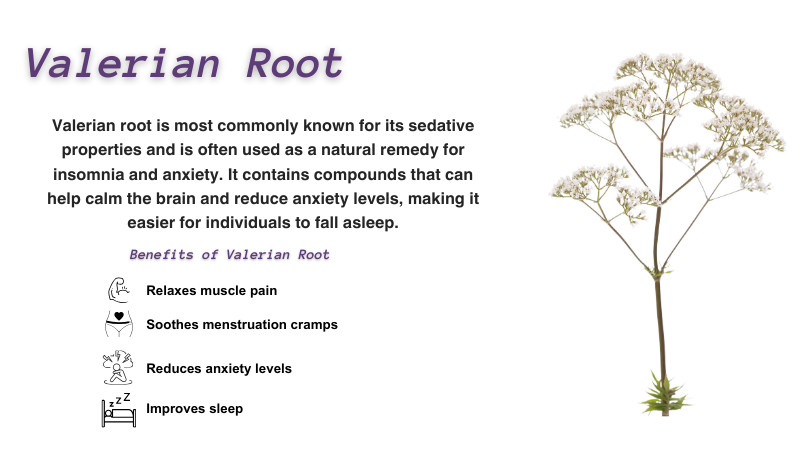
FAQs
What are the cardiac effects of Valerian?
Valerian root has been traditionally used for its sedative and calming properties. While it’s generally considered safe for most people, there have been anecdotal reports of heart palpitations as a side effect of using or discontinuing valerian root.
However, comprehensive research on its cardiac effects is limited, and more studies are needed to determine its impact on heart health.
Can you drink Chamomile with Valerian root?
Both chamomile and valerian root are popular herbal remedies known for their calming effects. While there’s no known harmful interaction between the two, combining them may amplify their sedative properties.
What plant is used for anxiety?
Several plants are traditionally used to alleviate anxiety. Lavender, passionflower, chamomile, and valerian root are among the most popular. These herbs have compounds that can help calm the mind and reduce anxiety levels.
When should you not take Valerian?
Consuming valerian root when pregnant is not advisable. Nor is the consumption when nursing. Particular care needs to be taken when using certain medications, especially sedatives or antidepressants. It’s also advisable to avoid valerian before activities that require alertness, such as driving a vehicle or operating machinery, due to its sedative effects
Which is better Chamomile or Valerian?
Both chamomile and valerian roots offer calming effects. The choice between them often depends on individual preferences and the intended application. While chamomile is commonly used for mild sleep disturbances and relaxation, valerian might be more potent for those with severe insomnia.
Does Chamomile improve sleep?
Yes, chamomile has compounds that can promote relaxation and improve sleep quality. Drinking chamomile tea before bed can help individuals fall asleep faster and enjoy a more restful night’s sleep.
How long before bed should I drink Chamomile?
For best results, it’s recommended to drink chamomile tea about 30 to 45 minutes before bedtime. This allows enough time for the calming effects to set in.
Is Valerian the same as Melatonin?
No, in a previous article, we looked at valerian vs melatonin and they are not the same. While both are used as sleep aids, natural melatonin is a hormone produced by the pineal gland in the brain, whereas valerian is an herbal supplement derived from the roots of the valerian plant.
Synthetic melatonin is something quite different to what your body produces naturally. 26
Can you take Magnesium and Valerian root together?
There’s no known harmful interaction between magnesium and valerian root. However, both have calming effects, so combining them may enhance their relaxation properties. Again, it’s always best to consult with a healthcare professional before mixing supplements. 27
Can you drink Valerian tea with high blood pressure?
While valerian root is generally considered safe, it’s essential to consult with a healthcare professional if you have high blood pressure or are taking medications for it. Some individuals might experience notable changes in blood pressure levels when consuming valerian.
Does Valerian root increase estrogen?
Valerian root acts as a phytoestrogen, an estrogen-like plant compound. As a phytoestrogen, valerian can help balance estrogen levels, especially during menopause. However, more research is needed to determine its full effects on estrogen levels.
Who cannot take Chamomile?
Individuals allergic to plants in the Asteraceae family, such as ragweed, marigolds, or daisies, should avoid chamomile. Also, if you have asthma, do not take Chamomile. Pregnant women should avoid drinking Chamomile since it can stimulate their uterus and might lead to circulation problems for the baby. Additionally, those taking blood-thinning medications or about to undergo surgery should consult with a healthcare professional before consuming chamomile. 28 29 30
Conclusion
In our exploration of the intriguing world of herbal remedies, we’ve delved deep into valerian root’s effects and benefits, particularly its potential connection to heart palpitations. While valerian root has been celebrated for centuries for its calming properties, it’s essential to approach its use with a well-informed perspective. As with all natural remedies, individual reactions can vary, and what works for one person might not work for another.

The question, can valerian cause heart palpitations underscores the importance of understanding the full spectrum of effects any supplement can have on our bodies.
Let’s journey together in pursuit of knowledge and a healthier lifestyle. Join our vibrant community on Instagram and Pinterest, and share your thoughts, insights, research, and personal stories related to “Can Valerian cause heart palpitations?”.
References
- “Valerian – Uses, Side Effects, and More” – WebMD Staff, Last checked 10 October 2023 [Web MD] [Archive] ↩︎
- “Valerian” – NIH Staff, Last checked 10 October 2023 [National Institutes of Health] [Archive] ↩︎
- “Valerian for Sleep: A Systematic Review and Meta-Analysis” – S. Brent, A. Padula, D. Moore, M. Patterson, W. Mehling, 13 April 2015 [PubMed Central] [Archive] ↩︎
- “The Effects of Valerian on Sleep Quality, Depression, and State Anxiety in Hemodialysis Patients: A Randomized, Double-blind, Crossover Clinical Trial” – M. Tammadon, M. Nobahar, Z. Naieni, A. Ebrahimian, R. Ghorbani, A. Vafaei, 31 March 2021 [PubMed Central] [Archive] ↩︎
- “Effects of Valeriana officinalis (Valerian) on tension-type headache: A randomized, placebo-controlled, double-blind clinical trial” – H. Azizi, A. Shojaii, F. Dabaghian, M. Noras, A. Boroumand, B. Haghani, R. Ghods, Last checked 11 October 2023 [PubMed Central] [Archive] ↩︎
- “The effect of Valerian root extract on the severity of pre-menstrual syndrome symptoms” – Z. Moghadam, E. Rezaei, R. Gholami, M. Kheirkhah, H. Haghani, 19 January 2016 [PubMed Central] [Archive] ↩︎
- “Valerian” – Mount Sinai Staff, Last checked 11 October 2023 [Mount Sinai] [Archive] ↩︎
- “Clinical studies on the treatment of coronary heart disease with Valeriana officinalis var latifolia” – G. Yang, W. Wang, Last checked 11 October 2023 [PubMed] [Archive] ↩︎
- “Valerian” – URMC Staff, Last checked 11 October 2023 [University of Rochester Medical Center Rochester] [Archive] ↩︎
- “Valerian for Sleep: A Systematic Review and Meta-Analysis” – S. Bent, A. Padula, D> Moore, M. Patterson, W. Mehling, 13 April 2015 [PubMed Central] [Archive] ↩︎
- “Drug Interactions between melatonin and Valerian Root” – Drugs.com Staff, Last checked 9 November 9 2023 [Drugs.com] [Archive] ↩︎
- “The Use of Valeriana Officinalis (Valerian) in Improving Sleep in Patients Who Are Undergoing Treatment for Cancer: A Phase III Randomized, Placebo-Controlled, Double-Blind Study: NCCTG Trial, N01C5” – D. Barton, P. Atherton, B. Bauer, D. Moore, B. Mattar, B. LaVasseur, K. Rowland, R. Zon, N. LeLindqwister, G. Nagargoje, T. Morgenthaler, C. Loprinzi, 1 January 2012 [PubMed Central] [Archive] ↩︎
- “Heart Palpitations” – New York Presbyterian Staff, Last checked 9 November 2023 [New York Presbyterian] [Archive] ↩︎
- “Valerian Root & Irregular Heart Rate” – D. Marks, 12 July 2011 [Healthfully] [Archive] ↩︎
- “Valerian Root Herbal Remedy Linked to Life-Threatening Hyponatremia” – Renal & Urology News Staff, 12 January 2017 [Renal & Urology News] [Archive] ↩︎
- “The Effects of Valerian Root on Hot Flashes in Menopausal Women” – P. Mirabi, F. Mojab, Last checked 9 November 2023 [PubMed Central] [Archive] ↩︎
- “Phytoestrogens” – BCPP Staff, Last checked 9 November 2023 [Breast Cancer Prevention Partners] [Archive] ↩︎
- “Valerian” – NIH Staff, 5 April 2020 [National Library of Medicine] [Archive] ↩︎
- “Valerian Root: Is It Safe for the Liver?” – The American Journal of Gastroentology Staff, Last checked 9 November 2023 [The American Journal of Gastroentology] [Archive] ↩︎
- “Long-Term Chamomile Therapy of Generalized Anxiety Disorder: A Study Protocol for a Randomized, Double-Blind, Placebo- Controlled Trial” – J. Mao, Q. Li, I. Soeller, K. Rockwell, S. Xie, J. Amsterdam, 20 October 2017 [PubMed Central] [Archive] ↩︎
- “A Comprehensive Study of Therapeutic Applications of Chamomile” – A. Sah, P. Naseef, M. Kuruniyan, G. Jain, F. Zakir, G. Aggrawal, 19 October 2022 [MDPI] [Archive] ↩︎
- “Chamomile: A herbal medicine of the past with bright future” – J. Srivastava, E. Shankar, S. Gupta, 1 February 2011 [PubMed Central] [Archive] ↩︎
- “The Therapeutic Potential of Apigenin” – B. Salehi, A. Vendetti, M. Rad, D. Kregiel, J. Rad, A. Durazzo, M. Lucarini, A. Santini, E. Souto, E. Novellino, H. Antolak, E. Azzini, W. Setzer, N. Martins, 15 March 2019 [PubMed Central] [Archive] ↩︎
- “Inhibition of Proinflammatory Biomarkers in THP1 Macrophages by Polyphenols Derived From Chamomile, Meadowsweet and Willow bark” – E. Drummond, N. Harbourne, E. Marete, D. Martyn, J. Jacquier, D. O’Riordan, E. Gibney, 18 June 2012 [John Wiley & Sons, Inc.] [Archive] ↩︎
- “Hypotensive effect of Chamaemelum nobile aqueous extract in spontaneously hypertensive rats” – N. Zeggwagh, A. Moufid, J. Michel, M. Eddouks, Last checked 9 November 2023 [PubMed Central] [Archive] ↩︎
- “Melatonin Synthesis and Function: Evolutionary History in Animals and Plants” – D. Zhao, Y. Yu, Y. Shen, Q. Liu, Z. Zhao, R. Sharma, R. Reiter, 17 April 2019 [Frontier Media] [Archive] ↩︎
- “Does magnesium help you sleep?” – C. Geng, 1 August 2023 [Medical News Today] [Archive] ↩︎
- “chamomile” – Medicine Net Staff, 6 May 2022[MedicineNet] [Archive] ↩︎
- “Anaphylactic reaction after the ingestion of chamomile tea: A study of cross-reactivity with other composite pollens” – J. Subiza, J. Subiza, M. Hinojosa, R. Garcia, M. Jerez, R. Valdivieso, E. Subiza, 17 March 2005 [Science Direct] [Archive] ↩︎
- “Herbal teas during pregnancy and breastfeeding” – Pregnancy Birth & Baby Staff, Last checked 9 November 2023 [Pregnancy Birth & Baby] [Archive] ↩︎
Last Updated on 5 months by D&C Editorial Team
